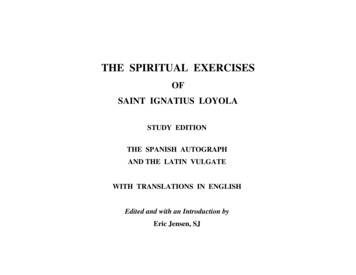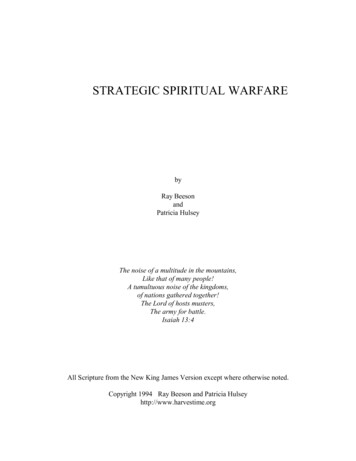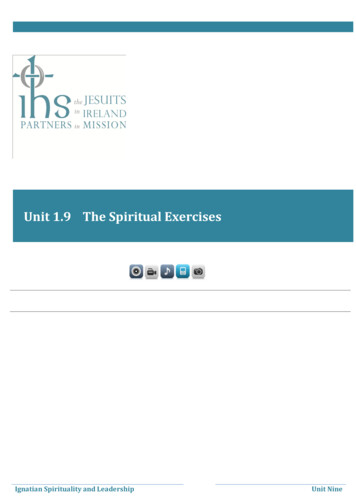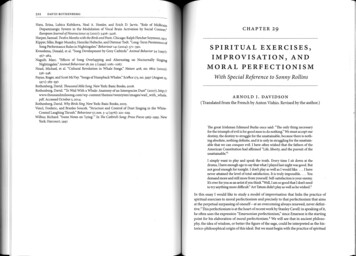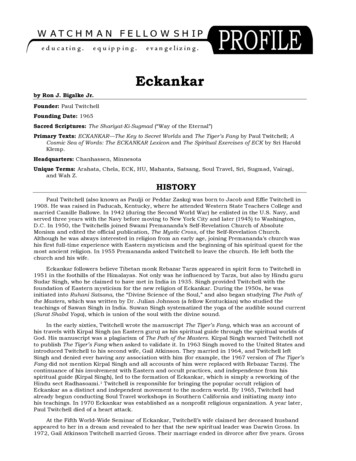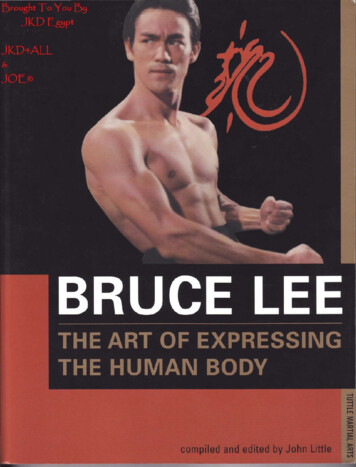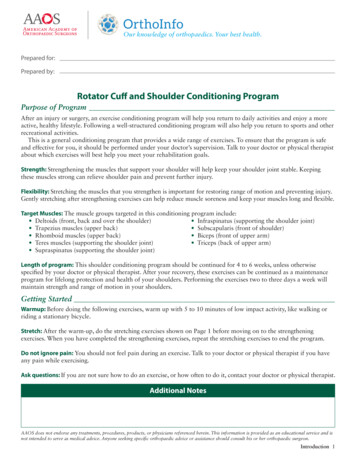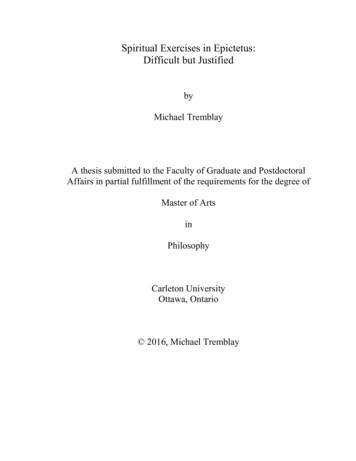
Transcription
Spiritual Exercises in Epictetus:Difficult but JustifiedbyMichael TremblayA thesis submitted to the Faculty of Graduate and PostdoctoralAffairs in partial fulfillment of the requirements for the degree ofMaster of ArtsinPhilosophyCarleton UniversityOttawa, Ontario 2016, Michael Tremblay
Abstract:The aim of this thesis is to provide a new interpretation about the role played by spiritualexercises in Epictetus’ program of moral therapy, in response to Brennan (2003) whoholds that they may potentially conflict with Epictetus’ intellectualism. I argue thatspiritual exercises are intended to cause us to assimilate theory by causing one to formspecific beliefs that are in accordance with theory. Understood this way, any sort oftension seems to resolve itself. I rely upon the work that Braicovich (2012) has done onthis question, and go further, ultimately demonstrating that all three of Epictetus’ spiritualexercises can be explained coherently when understood as aiding in the assimilation oftheory. I conclude by proposing that Epictetus thought of Stoics like athletes in trainingfor whom spiritual exercises are essential to staying fit and ready to perform.ii
Acknowledgements:It gives me great pleasure to express my gratitude to my supervisor, ProfessorAnnie Larivée, whose unique approach to philosophy, passion for teaching, and demandsfor excellence have both facilitated this thesis and inspired me to be a better academicand philosopher.I would like to thank my parents, Peter Tremblay and Sandy Wooley, as well asmy sister, Alison Tremblay, for their constant support and enthusiasm when it comes tothe writing of this thesis. It is only because of them that I have the confidence andopportunity to pursue my passion for philosophy.I would like to also thank the following people who have contributed to theprocess of writing this thesis: My Grandmother Peg Wooley, for her feedback on myrough drafts and our discussions about the merit of Stoicism; Patricia Pajunen for alwayswilling to debate the specifics of Stoic theory; Timmy Grainger and Jonathan Reardon fortheir insightful comments about the style and substance of my drafts; Melanie White forher impeccable help with editing and her constant support for all of my endeavors; themembers of class PHIL4004/5600, for allowing me to present an early version of thisthesis, and for providing excellent feedback.iii
Table of Contents:Abstract: . iiAcknowledgements: . iiiTable of Contents: . ivPreface: . vi12345Chapter: Epictetus’ Intellectualism and Psychology . 11.1Introduction to Intellectualism. 31.2Beliefs . 101.3Belief Formation. 161.4Belief Modification . 20Chapter: Spiritual Exercises and Intellectualism . 262.1Possible Conflicts with Intellectualism . 262.2The Irrelevance of Spiritual Exercises. 372.3Sellers and Spiritual Exercises . 41Chapter: Spiritual Exercises Reimagined . 483.1Spiritual Exercises and Specific Beliefs . 483.2Critical Assent: . 563.3Repetition Exercise . 60Chapter: Habituation Exercise and Questioning Exercise . 704.1Habituation Exercise Described . 704.2Habituation and Specific Beliefs . 754.3Questioning Exercise . 844.4Questioning Exercise and Specific Beliefs . 90Chapter: The Athlete Analogy . 95iv
5.1Specific Beliefs and Muscle . 955.2Impressions as Wrestling Opponents . 1035.3The Glory of Victory . 1075.4Conclusion . 111Bibliography: . 112v
Preface:The aim of this thesis is to provide insight into the exact role and nature thatspiritual exercises have in the philosophy of Epictetus. More specifically, it is a directresponse to the paper “Stoic Moral Psychology”, within which Tad Brennan argues thatEpictetus’ reliance upon repetition to modify belief is inconsistent or incompatible withthe unified reasoning soul he endorses as a Stoic. To resolve this problem, I will providean interpretation of spiritual exercises within Epictetus which does not conflict with hisconception of the self as wholly rational.Brennan’s concern is that the exercises in Epictetus seem to be, at least primafacie, a non-cognitive modification strategy which is essential or necessary for theformation of correct beliefs (Moral Psychology, 2003, 278). Brennan also argues that “itis a plausible rule of thumb that what can only be altered by non-rational means is a nonrational state” (Moral Psychology, 279). Brennan’s argument is a problem becauseEpictetus’ reliance upon repetition would seem to force him to hold the view that beliefsare at least in part non-cognitive, which is not something a Stoic would endorse.However, Brennan is not steadfast in his view. By acknowledging that thisconflict is founded from a prima facie viewpoint, and that his criticisms are plausible, butnot certain, Brennan is inviting further dialogue and discussion of the issue. Otherphilosophers have proposed interpretations of spiritual exercises which do not conflictwith intellectualism. I will look at Sellers’ (2007) and Cooper’s (2007) accounts but deemthem to be insufficient.My aim is to construct an account that takes the best parts from Sellers (2007)while acknowledging the problems raised by Brennan (2003) and Cooper (2007).vi
My thesis will be divided into five chapters:1. Epictetus’ Intellectualism and Psychology2. Spiritual Exercises and Intellectualism3. Spiritual Exercises Reimagined4. The Habituation Exercise and the Questioning Exercise5. The Athlete AnalogyIn Chapter 1, I will outline Epictetus’ intellectualism and, using quotes from theprimary text as well as secondary sources, identify what precisely this intellectualismcommits him to, such as the impossibility of akrasia or weakness of will.In Chapter 2, I will focus on how spiritual exercises possibly relate to Epictetus’intellectualism commitments. This first section will discuss Brennan’s (2003) concernsabout the potential conflict between these exercises and a wholly rational conception ofthe mind, while the next two sections will examine Cooper’s (2007) and Sellers’ (2007)interpretations of spiritual exercises respectively.In Chapter 3, I will put forward my own original account of the purpose or role ofspiritual exercises within Epictetus. I will then examine a paper by Braicovich (2012) inwhich he discusses a specific exercise, the Repetition Exercise, in great detail. Hisaccount of this specific exercise fits perfectly with my interpretation of spiritual exercisesin general and it will lay the foundation for examining the other two exercises.In Chapter 4, I will then look at the other two spiritual exercises present in Epictetus,which I will call the Habituation Exercise and the Questioning Exercise. I will explainhow they are intended to contribute towards our moral progress, and demonstrate howthey fit my interpretation of spiritual exercises.vii
Finally, in Chapter 5, I will discuss the analogy Epictetus makes between aphilosopher and an athlete. While Epictetus is not always explicit about what he believed,I hold that this analogy shows my interpretation of spiritual exercises to be in accordancewith how Epictetus conceived of the process of moral progress.viii
1 Chapter: Epictetus’ Intellectualism and PsychologyIn this thesis, I will refer to secondary sources for clarification and additional insight.However, the bulk of my interpretation will be focused on a primary source, theDiscourses by Epictetus.I am focusing my attention primarily on the Discourses because I believe it is the bestresource available for obtaining accurate insight into Epictetus’ philosophy. Epictetus didnot write anything himself, but rather had his lessons transcribed by his pupil, Arrian.Despite not being written by Epictetus, there is still little to no reason to believe that theseworks are not accurate representations of what Epictetus taught and believed to be true(Dent, xvii; Dobbin, vii-viii; Long, 2002, 41). There are only two remaining workswritten by Arrian and attributed to Epictetus. These works are the Discourses and TheHandbook. In addition, there remain 36 fragments. Of these writings, only the Discoursesare conceived of as being a comprehensive and in-depth representation of the philosophyof Epictetus. Unlike The Handbook, much of the Discourses are written in the form of adialogue, either real or hypothetical, between teacher and student. Not only is this anaccurate representation of how Epictetus instructed, but such a dialectic form is also apart of his pedagogical method. Much like Socrates, the dialectical form may have beenconsidered by Epictetus as an essential part of how to teach philosophy (Long, 2002, 86).All of this is lost when we rely too heavily upon the fragments and The Handbook.In addition, fragments by their very nature cannot be systematic, and often theycannot even be contextualized. And while the The Handbook is a complete work, it wasconceived of by Arrian as a kind of summary of the Discourses which would contain thesame ideas, but lack detailed justifications, explanations, and dialogues about these ideas
(Dobbin, vii; Long, 2002, 9). As such, while it is still a valuable text,1 ideally designedfor the practicing Stoic to quickly reference, it does not lend itself as well to an in depthphilosophical reading as the Discourses does (Dobbin, xxiii).Thus by focusing predominantly on the Discourses, I will be able to examine the textto a level of depth not possible if I extend my focus too broadly. And additionally, I willnot be misrepresenting the philosophy of Epictetus. If anything, I believe I am beingmore faithful to Epictetus by focusing on the Discourses.The translation I will using is the 1995 Everyman’s edition of The Discourses, TheHandbook, Fragments, translated by Robin Hard. I am using this edition because it iscomprehensive, including every chapter of the Discourses that have survived. Othereditions exclude chapters of the Discourses deemed superfluous, unnecessary, or evenrepetitive.2I will also be working heavily from Tad Brennan’s book The Stoic Life: Emotions,Duties, and Fate, which outlines very well the basic principles of Stoic psychology. Aswill be shown, I do in fact endorse Brennan’s conception of Stoic psychology. It is onlyupon the role that spiritual exercises play within that psychology that our views diverge.1A fundamental part of the value of The Handbook will become apparent in laterchapters. Specifically, it seems to be a tool explicitly designed to aid in the RepetitionExercise I will discuss in detail in Chapter 3.2Given that part of my topic is focused upon the important role that repetition held forEpictetus, it is interesting to note that contemporary philosophy and translators do nothold repetition to the same high esteem. There might be a serious problem here if in theprocess of attempting to adapt material for contemporary study and consumptiontranslators actually remove an aspect of Epictetus’ philosophy he would have deemed tobe essential. For example Dobbin, translator of the Penguin Edition of the Discoursesand Selected Writings, admits to removing repetitive passages: “ I have omitted frommy translation of Books III and IV a number of discourses that I judge to be little morethan restatements of ideas developed to better effect elsewhere” (xxiii).2
The goal of this chapter is descriptive in nature. I hope to outline Epictetus’intellectualism, and to determine what exactly this intellectualism entails, and what itcommits him to. I will then develop what influence this intellectualism has had on howEpictetus conceives of human psychology, more specifically the nature of beliefs, beliefformation, and belief modification. As such, this chapter will be divided into four parts:i.Introduction to Intellectualismii.Beliefsiii.Belief Formationiv.Belief ModificationA feature of studying the Discourses that is unavoidable is that due to the text’snature as a series of lessons, Epictetus is not always explicit about his conception of themind, especially when it comes to specific and technical aspects of human psychology.However, I am confident that even though he is not explicit, we can reasonably inferwhat he holds to be true based on what he does explicitly make clear, and based on hismembership in a philosophical school that did have other members who were more directin their explanation of technical concepts. As such, where there is no reason to think thatEpictetus disagreed or diverged from orthodox Stoicism, I will refer to secondaryliterature which describes Stoic intellectualism and psychology as a whole.1.1Introduction to IntellectualismAn accurate understanding of intellectualism in Epictetus is necessary for tworeasons. First, it is necessary to properly understand the merit behind Brennan’s concerns3
of inconsistency within the work of Epictetus, and secondly it is necessary to properlyunderstand my proposed solution to these concerns.Roughly speaking, intellectualism is the idea that the self is entirely rational and thatknowledge is sufficient for virtue. This stands in stark opposition to the conception of theself famously put forward by Plato in the Republic, in which the self is divided and hasnon-rational aspects. Epictetus endorsed intellectualism, which puts him in line with mostof his Stoic contemporaries and predecessors (Long, 2002, 17).3 A wholly rational self isone of the main tenants of Epictetus’ philosophy and is an essential presupposition ofmost of his ethical theories and arguments.For the sake of brevity and focus, this introduction will only examine two parts ofEpictetus’ intellectualism. Firstly, that Epictetus’ particular form of intellectualismconceives of the mind as being comprised of one faculty within which there are threedistinct occurrences. And secondly, that self-identity is limited exclusively to ourrationality.In the Discourses, there is only one faculty that Epictetus makes reference to whendescribing the mind. This is the faculty of reason. Then there are three mentaloccurrences within that faculty. These are impressions, the act of assent, and the impulseto act (Braicovich, 315).Beginning with impressions, they are a mental idea or conception of something. Theyusually carry with them a kind of propositional content that such and such is the case3While there is an ongoing interpretive debate as to whether the Stoics conceived of theself as being monistic or comprised of many faculties (Inwood, 1985, 28) what isimportant for this discussion is that we can be sure that Epictetus conceived of the self asentirely rational.4
(Nussbaum, Therapy, 374). It is due to this propositional content that they can be deemedtrue or false. Often impressions take the form of a specific mental picture, in fact “mostimpressions arise from our senses, or from our memories of sensory episodes—seeing outthe window, or closing my eyes and remembering what I saw” (Brennan, Stoic Life, 52).However, impressions are not limited to things that can be easily visualized. They canalso be any descriptive proposition, such as the idea that two and two makes four. Theycan also have normative value. I may have the descriptive impression that it is day ornight, but I can also have the normative impression that ice cream is good, or thatphysical suffering is bad.It is important to note that impressions are not at all separate or distinct from themind. They are very much a part of it. As Brennan describes, “according to the Stoics, animpression is just a piece of matter in a certain configuration; it is my mind, altered inaccordance with the thing that makes the impression on it” (Brennan, Stoic Life, 54-55).4Epictetus recognizes this when he asks “So, what is rationality itself? A structure madeup of various impressions” (1.20.5).5The second occurrence within the mind is the act of assent. The faculty of reasonreflects upon these impressions and has one of three choices. It assents to them as beingtrue, dissents from them as false,6 or withholds assent until a later time (Braicovich, 316).4Long offers a similar definition of an impression: “anything at all that ‘appears’ to us,anything that constitutes an instance of our awareness” (Long 1996b, 274)5This is a translation by Long, not by Hard, but I believe Long’s translation betterrepresents what I am attempting to show here, namely that our mind is composed ofnothing but impressions, and our judgements about them.6How one would dissent to an impression as false is to assent to its negation. If theimpression is “Diotima walks”, then the negation that I assent to will be “Not: Diotima5
All aspects of our psychology, be it beliefs, emotions, motivations or desires, can bereduced and attributed to specific impressions, and our assent to those impressions, orlack thereof (Brennan, Stoic Life, 52).Thus the concept of the rational faculty, and its ability to assent, is at the core of Stoicand Epictetan psychology. In the words of Brennan: “assent is the linchpin of the Stoicsystem. Assent is the fundamental psychological activity—more fundamental even thanbelieving something, or desiring something” (Brennan, Stoic Life, 52).The third aspect, the impulse to act, is derived from the kind of impression we assentto. If I assent to an impression with affective content, that assent will cause an impulse toact that motivates me towards a certain action. What determines if an impression hasaffective content is if it relates to an object which I value (or disvalue). If I assent to animpression that a snake is in front of me, and I also have the belief that snakes aredangerous to my health, and my health is something valuable, then my assent willmotivate me to remove that danger, perhaps by killing the snake or fleeing outright.So to provide a quick example of Epictetian psychology, imagine I hear of the deathof a close friend whom I value as having a significant role in my life. I therefore have theimpression that my friend has died. I then apply the faculty of reason to this impression,and assent to it as true. This impression is affective, because it concerns the status ofsomeone to whom I have ascribed great value. Thus, I may have the impulse to grieve,with all the emotions and actions grieving entails. This grieving process is reducible towalks”. Dissent must take this strict form because to assent to a statement such as“Diotima doesn’t walk”, would assume the existence of Diotima, something not entailedby my dissenting to the initial impression. For further discussion on the Stoic conceptionof negations, and their logic in general see Bobzein (2003).6
my assent to the impression as true. If I never give assent to the impression that myfriend has died, none of the accompanying beliefs, emotions, and actions will follow.Change the example anyway you like, for Epictetus all cognitive activity can bereducible to impressions and our assent to them, or, in Epictetus’ terminology, our use ofthe impression. In a telling passage, Epictetus defends this theory against the criticismthat this is too simplistic an account to justify the complexity of human emotion:[In reference to the Greek Tragedy Medea, in which Medea murders her children out of ragedirected at her unfaithful husband] So, do such great and dreadful deeds have this as theirorigin, then, sense-impressions? This and no other. The Iliad consists of nothing butimpressions and the use of those impressions. An impression prompted Paris to carry off thewife of Menelaus. An impression prompted Helen to follow him. If, then, an impression hascaused Menelaus to feel that it was an advantage to be robbed of such a wife, what wouldhave happened? Not only the Illiad would have been lost, but the Odyssey too. (1.28.11-13)What Epictetus is saying is that even in a story with such complex motivations andemotions as the Illiad, all of the motivations, emotions, beliefs and desires are reducibleto impressions and their use. If Menelaus had received a different impression, or hadwithheld assent to the impression he did have, then his emotions, beliefs, desires andmotivation would have been different, and the Illiad would not have come to pass.What makes the fact that our belief and motivations can be reducible to patterns ofassent so important for Epictetus is that, as rational beings, our ability to assent isultimately up to us. We thus possess an uncanny amount of autonomy in determining thenature of our inner life. In fact, this is the only part of our lives that can be said to be truly7
up to us, or within our power. Epictetus says in reference to the faculty of reason that “thegods have placed this alone in our own power, the most excellent faculty of all whichrules all the others, the power to deal rightly with our impressions, whilst all the othersthey have not placed in our power” (1.1.7).Epictetus is saying that the Gods have given us the power to assent to, or withholdassent from, our impressions, through providing a rational faculty. Power is meant in thestrong sense here. We may have a degree of power over our bodies, but this is ultimatelycircumstantial and severely limited. Thus it is not real power. It is possible for our bodiesto be chained, or maimed, or otherwise permanently altered and their functionpermanently impeded by things outside of our control. But when it comes to our rationalfaculty, even the gods may not impede us (1.1.24).The point here is that if our complex psychological states are comprised of nothingbut impressions and if we have total control over how we make use of our impressions,through control over our ability to assent, then we have control over our minds. This isone of the key concepts behind Stoicism’s powerful assertion of our autonomy.The second key aspect of Epictetus’ intellectualism is that self-identity can only beattributed to our rationality. This means that Epictetus is not satisfied to just make theclaim that the state of our minds are up to us. By equating our minds with our selfidentity, he goes a step further and asserts that who we are in any meaningful sense is upto us. In the following passage of the Discourses, Epictetus describes how a philosopherwho understands that their identity is their rationality would respond to the threat ofphysical imprisonment: “[The philosopher is asked to betray a secret] – I will not betrayit; for this is in my own power. – ‘Then I will fetter you.’ --- What are you saying, man?8
Fetter me? You will fetter my leg; but not even Zeus himself can get the better of mychoice” (1.1.22-24).The point here is two-fold. First, Epictetus is clarifying that our body is not our self.The tyrant thinks he is threatening to fetter the philosopher but, as Epictetus points out, aphilosopher’s leg is not the same thing as that philosopher. As Epictetus says earlier inthe same chapter it is crucial to “not forget that this body is not your own” (1.1.11).What he wants us to realize is that our identity actually resides in our rationality, or ourability to choose which impressions we assent to and which we do not. And this ability tochoose is necessarily free from outside control.Rationality is not arbitrarily chosen as the self. The very reason we can say that ourability to assent is our own, but our bodies are not, is because one is up to us and theother is not. In other words, for Epictetus we can only say that something is ours if it isup to us, if we have control over it. And the only thing that is up to us is the use of ourrational faculty.This brings up a paradox of intellectualism. If we have total power over ourrationality, and our minds is entirely rational, and our mind is all we are, then why do weso often not feel in control of ourselves? Why are we ever unhappy, or disappointed orangry if we have the freedom to will ourselves to be otherwise? For Epictetus the answeris obvious. We internally limit ourselves. We remove our natural freedom through poorchoices. This is quite concisely summarized by A.A. Long:[For Epictetus] You and I are not our bodies, nor even do we own our bodies. We, ouressential selves, are our volitions. In that domain, and only in that domain, we have the9
possibility of freedom. This freedom, though it is our inalienable nature, is typicallyjeopardized, because people identify themselves with their bodies and all manner of externalthings----other persons, commodities, political powers, and so forth. Real lasting freedom isnot available to humans in any of these domains; consequently, those who pursue them areconstrained, thwarted, and emotionally enslaved as a result of the mistaken attachments theymake. (Epictetus, 29)Humans have the tendency to be ignorant, and mistakenly self-identify with thingsoutside of their rationality. This causes suffering, because we do not have control overthose things, nor were we meant to have control of them. The nature of Epictetus’ ethicsis thus a response to this human tendency. Through practice, education and rationalargument, his ethical theory aims to correct our mistaken beliefs such that we only attachvalue to ourselves, or our ability to choose.Now that an introduction to intellectualism has been provided, I will move todescribing Epictetus’ conception of our psychology. As this thesis deals with howrepetition impacts belief, the important questions are: What are beliefs? How are theyformed? And by what means can they come to be changed?1.2BeliefsSo what exactly are beliefs to the Stoics, and what is their nature? As describedbriefly above, we know that beliefs have something to do with assenting to animpression. But an important distinction needs to be established here betweenimpressions and beliefs. Brennan provides a succinct definition for a belief:10
“Stoic Definition of Belief: a belief is an assent to an impression” (Brennan, StoicLife, 65).7So first let us examine what it means for a belief to be an assent to be an impression.This means, first and foremost, that a belief is an event or an action. It is not a static state.It is not something to be carried with you, but rather something that happens. To use anexample, imagine I have the belief “B” which is an assent of impression “I”. What thismeans is that I had an impression “I”, which carried with it some propositional content.This propositional content was then judged by my rational faculty, and then assented to.This “assenting”, the act of my rational faculty assenting to an impression, is what “B” is.Beliefs are thus a kind of action, like running or throwing. This process could be ascomplex as dealing with trauma or tragedy, or this process could concern a trivial fact. Imight taste ice cream, receive the propositional content from that impression that icecream is good, assent to that impression, and then this act of assent would be my beliefthat ice cream is good.What this definition also means is that a belief is not, and cannot, be an impression.Nor can an impression be a belief. The two are structurally distinct. As Brennanacknowledges: “states and events are completely different sorts of things; on the Stoicview an impression is a state, and a belief, because it is an assent, is an event” (Brennan,Stoic Life, 66). Recall that an impression is a configuration of the mind. It is a way theNussbaum offers a similar definition: “a judgement, for the Stoics, is defined as anassent to an appearance” (Therapy, 374)711
mind is, a specific state of the mind. A belief by contrast is an event or action. A beliefcan still be temporally extended, it does not have to be instantaneous, but it cannot ev
2. Spiritual Exercises and Intellectualism 3. Spiritual Exercises Reimagined 4. The Habituation Exercise and the Questioning Exercise 5. The Athlete Analogy In Chapter 1, I will outline Epictetus’ intellectualism and, using quotes from the primary text as well as second
